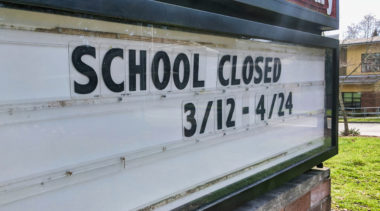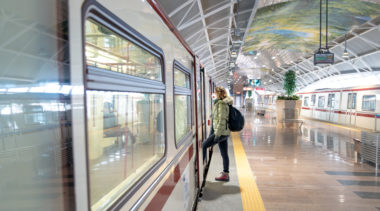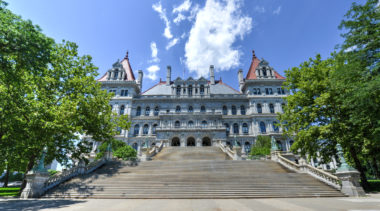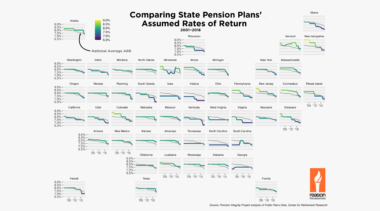Latest
-
Water Markets Present a Solution to Florida’s Water Bottling Conflict
A market-based approach would treat all users equally and result in prices that are more accurately determined by supply and demand.
-
The Town of Gilbert and How Pension Debt Drives Rising Costs for Arizona Municipal Governments
The town of Gilbert's total payments to ASRS and PSPRS have skyrocketed from about $1 million per year in 2001 to almost $18 million in 2018.
-
Infographic: 3 Rules to Help School Finance Systems Impacted By Coronavirus
COVID-19 is prompting a harsh new fiscal reality for states and school districts. Here's what state and school district officials can do to adapt.
-
Rolling Back Regulations to Combat COVID-19 Should Be Just the Start
Once the coronavirus pandemic passes, lawmakers should permanently eliminate many of the unnecessary regulations they've temporarily suspended.
-
Hawaii’s Successful Experience With Weighted-Student Formula Has Improved Funding Equity
The weighted-student formula has provided a much more equitable, responsive and transparent way to fund Hawaiian schools.
-
The Economic Consequences of Fuel Economy Standards
This is the fourth in a series of briefs explaining and evaluating Corporate Average Fuel Economy (CAFE) and zero-emissions vehicle (ZEV) standards.
-
Examining the City of Prescott and How Pension Debt Drives Rising Costs for Arizona Municipal Governments
Prescott's total payments to ASRS and PSPRS have skyrocketed from about half a million dollars per year in 2001 to more than $7 million in 2018.
-
Bill Expanding School Choice in Florida Is a Big Win for Florida’s Students and Families
The greatest accountability measure for any school is that parents and kids can “vote with their feet” by taking all their scholarship dollars to another school if they’re dissatisfied.
-
Why States Should Scrap Their Online E-cigarette Bans During Coronavirus Pandemic
Eliminating online sales bans would help keep vape shops in business and prevent unnecessary trips outside of the home, assisting with social distancing.
-
State Aid in Coronavirus Stimulus Spending Bill Greatly Favors Low Population States
Wyoming is slated to receive $2,160 per capita while New York and Washington state, two of the states that have been hit most heavily by the coronavirus pandemic, look like they'll receive just $389 per capita.
-
Coronavirus May Deliver the Final Blow to Overrated Commercial Real Estate Deals
More than half of the mortgages in CMBS deals are on offices, hotels and retail buildings— three categories especially hard hit by shelter-in-place orders issued during the coronavirus pandemic.
-
Looking For Permanent Process Solutions to Help Address the National Debt Crisis
"Our Constitution says very little, almost nothing, about how federal officials must care for or process our money."
-
To Help Fight Coronavirus, States Can Eliminate Alcohol Rules Preventing Homemade Hand Sanitizer
Many states prohibit the sale of grain alcohol in concentrations high enough for homemade alcohol-based hand sanitizers to be effective.
-
Education Newsletter: COVID-19’s Fallout For School Finance, Benefits of Open Enrollment, and More
Plus: How schools can best adapt during the coronavirus pandemic, and examining school finance in Arizona, South Carolina, and Indiana.
-
Pension Reform Newsletter: New Mexico Enacts Pension Reform, Coronavirus Compounds Pension Debt, and More
Plus: How alternative investments may pose challenges to pension funding, analysis of Arizona's growing municipal pension debt, and more.
-
Mass Transit Stimulus Spending Should Be Limited to Providing Operations, Focus on Transit-Dependent Riders
Federal lawmakers should specify a ceiling for total stimulus aid and provide monthly payments based on a calculation of the passenger revenue lost and the extra cleaning costs incurred by each system.
-
Proposal to Ban All Tobacco Products Wouldn’t Help New York Fight Coronavirus
The scientific case for the prohibition of all tobacco products in response to the coronavirus pandemic remains weak, and for e-cigarettes it is non-existent.
-
Map: Comparing State Pension Plans’ Assumed Rates of Return
This visualization shows how states have been gradually adjusting their assumed rates of return down to more realistic levels.

















